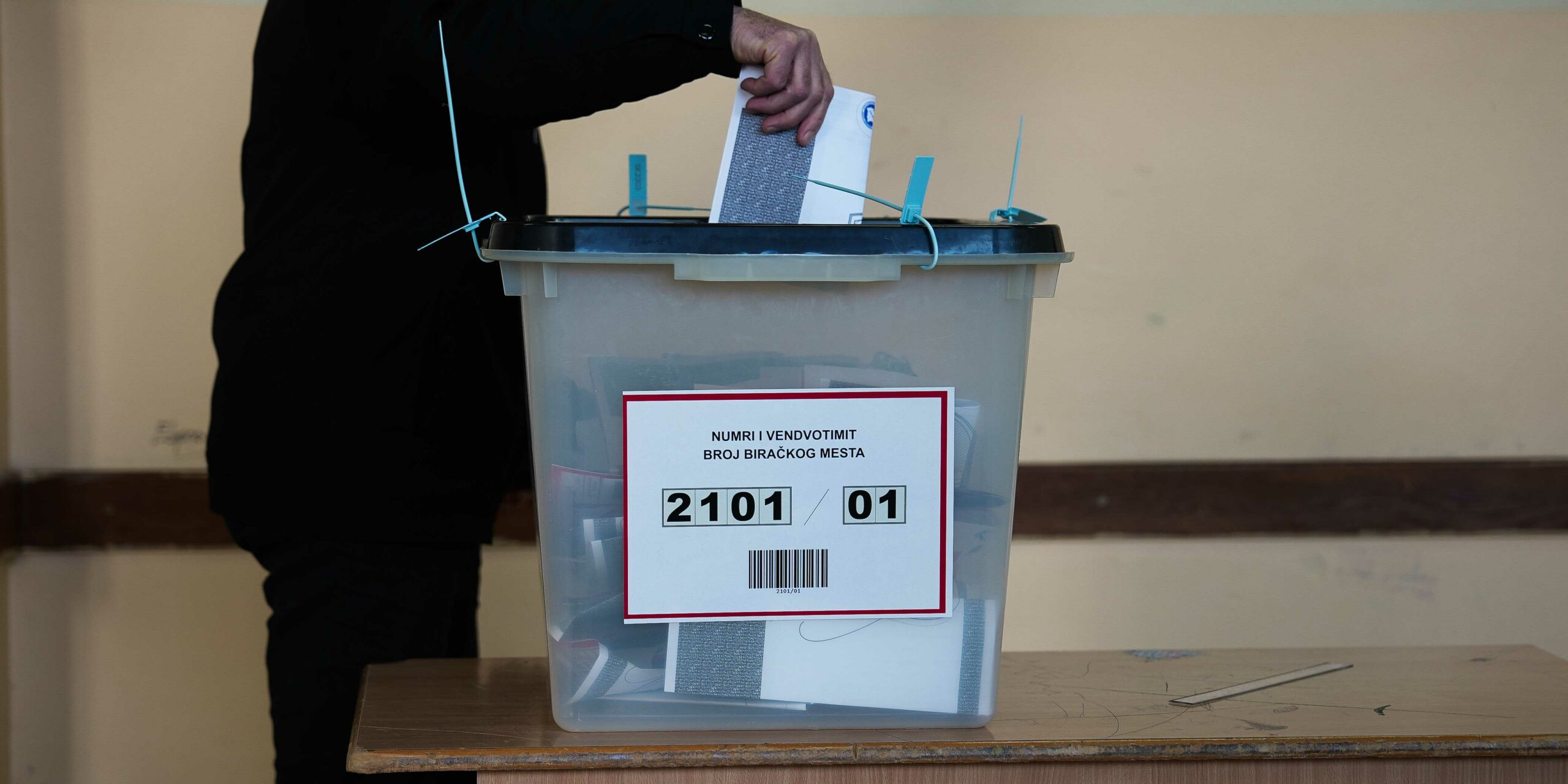

The preliminary results place the ruling party Vetëvendosje, with the highest votes in Kosovo's parliamentary elections held on Sunday, securing more than 41 percent of the vote.
The ruling Vetëvendosje party has declared victory in the Kosovo parliamentary elections, but the partial preliminary results predict it will not be able to form a government on its own.
Preliminary results published by the Central Election Commission, CEC, with more than 73 percent of the votes counted, gave Vetëvendosje 41.99 percent of the votes.
Prime Minister Albin Kurti, in a statement to the media, declared his party the winner of the elections and said that it will form the government.
“We are first, this is a confirmation for good governance. Furthermore, our winning coalition will establish the new government, Kurti 3, and we will continue the good work,” he said.
According to him, Vetevendosje emerged as the winning party despite facing a hybrid war against them.
“Citizens have shown resilience against a hybrid war waged by oligarchs. Against all odds, the people won, Vetevendosje won. For everyone, it is clear that those in second and third place, even if they join forces, cannot be as strong as Vetevendosje,” Kurti added.
The opposition parties received the following results: the Democratic Party of Kosovo, PDK, with 22.68 percent, the Democratic League of Kosovo, LDK, with 17.9 percent, the AAK-NISMA coalition with 7.56 percent, and the Belgrade backed party representing Kosovo Serbs, Lista Srpska with 2.98 percent.

61 Seats (50 percent of the votes) out of 120 are needed to form the Government. PM Kurti had claimed during the election campaign that Vetëvendosje would not form a post election governing coalition if they did not win the majority of the votes.
A total of 28 political parties and one independent candidate, a total of 1,280 candidates, ran for the 120 seat parliament. Twenty seats in the Kosovo parliament are reserved for the non-Albanian communities, who enter the parliament even if they do not reach the 5 percent of votes requirement.
The Central Election Commission, CEC, deemed the election process as regular, with voter turnout over 40 percent, representing approximately 800,000 out of the 1.9 million eligible voters, excluding conditional votes, and the votes of people with special needs and of diaspora.
In addition to the 1.9 million voters in Kosovo, more than 14,000 voters participated in the election at 17 Kosovo embassies and 15 consulates abroad while the number of ballots by post is still unknown.
Nonetheless, the CEC experienced issues with the electronic vote counting system, which caused the website not to function for several hours.
Kreshnik Radoniqi, chairman of CEC, told media that “the CEC staff and we, the CEC members, will be here all night working on entering all the data from the forms of the polling stations manually into the system. The data will likely be entered by 03:00 or maybe 04:00 in the morning, but I can’t say for sure.”
Local media reported that the prosecution initiated investigations which were denied by the prosecution to BIRN.
The leader of LDK and its candidate for PM, Lumir Abdixhiku, claimed that “we have a considerable growth [compared to 2021], although not satisfactory, it gives us an opposition placehold, but these are still preliminary results.” Abdixhiku took responsibility for the results and said that if the people “don’t see me as the PM,” he will gladly remain in opposition.
The leader of AAK and the PM candidate of AAK-NISMA coalition, Ramush Haradinaj, stated that the opposition is the winner of these elections.
“What makes me happy is the fact that the opposition has won these elections, and I look forward to collaborating in the formation of the government,” he said after the polls were closed.
Blerand Stavilevci, a PDK official told the media around midnight that PDK “has been confirmed as the second biggest political force in the country with over 200 thousand votes. This is PDK’s best result in many years and a clear testimony of PDK vision for Kosovo”.
The Kosovo Police claimed that “in terms of security, the electoral process was calm and free of serious incidents,” and the registered cases “did not affect the overall conduct of the elections.”
The State Prosecutor’s Office confirmed the detention of eight individuals for criminal offenses related to voting rights violations, including group voting (mainly in serb majority municipalities), photographing the vote and exercising influence.
A BIRN crew was hindered while monitoring the voting process in the ‘Kralj Milutin’ elementary school in the Serb majority municipality of Gracanica.
These parliamentary elections marked the first regular elections in Kosovo since it declared independence in 2008, meaning the Vetevendosje led government is the only one to finish a four year mandate.
After the 2019 parliamentary elections, Vetevendosje and LDK had formed a governing coalition, with Kurti as the PM, which was ousted in March 2020, only after 51 days in the office. Snap elections were triggered in December 2020, when the Constitutional Court of Kosovo ruled that the coalition government led by Avdullah Hoti’s LDK was illegitimate because it had been voted into office with the help of an invalid vote cast by an MP with a criminal conviction in the last three years.
Vetevendosje won the February 2021 elections by a landslide, being able to form a government without needing a coalition with any opposition party.
10 February 2025 - 00:25

The election is seen as a crucial test for current Prime Minister Albi...

The ‘Narodna Pravda (People’s Justice)’ party, which hopes to re...

Ramush Haradinaj, leader of the Alliance for the Future of Kosovo, AAK...

With a lack of success in foreign affairs, Kosovo's political oppositi...

Each party and coalition competing in the Kosovo February 9, 2025 elec...

Amid challenges in energy supply and economic stagnation, opposition p...

Kosovo opposition parties have pledged to make substantial reforms in ...

Kosovo government decided on Friday to donate 500,000 euros in humanit...